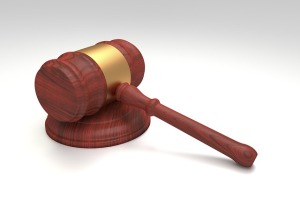
In true lawyer fashion, I’ll begin with a couple of caveats:
• I am an appellate attorney. I don’t do trial work. I read trial transcripts, as well as appellate decisions that analyze what went on at trial and the rules that were or were not followed there. This gives me a fair-to-middling knowledge of what really goes on in courtrooms. It is possible that some evidentiary rules, for example, tend to be ignored in practice.
• I’m licensed to practice only in Indiana and some federal jurisdictions. (I am an inactive member of the California bar as well.) I’ll try to confine my comments to principles and procedures that are likely to apply nationwide, and to indicate when different states’ rules may vary.
One of the best ways to prepare for writing convincing legal fiction is to read the work of lawyers — particularly litigators — who write the stuff. I recommend the novels of Scott Turow. This bestselling author taught writing at Stanford University before going to Harvard Law School. He has been writing and practicing law ever since, with a great deal of high-profile trial work to his credit.
Here are some legal principles and procedures that it would behoove an author of legal fiction to keep in mind.
Courtroom surprises: Modern American jurisprudence aims to keep these to a minimum. As part of the process called “discovery,” attorneys must usually disclose to opposing counsel the witnesses they intend to call. Potential witnesses and other third parties may be “deposed” — required to testify outside the courtroom (typically in a lawyer’s office) under oath — as part of the discovery process. In addition, each side may ask the other detailed written questions (interrogatories) about the positions they will be taking on any number of factual issues, or ask them to admit disputed facts (requests for admissions). The attorneys also may require the opposition to disclose documents and other physical evidence, although there are grounds for resisting some such requests.
“Bad acts”: If a man is on trial for rape, can you show that he beats his wife? Generally not. Proving the defendant’s prior “bad acts” is considered likely to prejudice the trier of fact (especially if it’s a jury deciding the facts) against the defendant, without actually showing that the defendant is more likely to have committed the particular crime with which he’s charged.
Well, how about proving that he raped someone last year? What if he was convicted of that rape? No, you still can’t use that conviction to show he’s more likely to have raped someone this year.
You can introduce evidence of that prior conviction, or of the underlying crime, under some circumstances. Basically, you have to be trying to prove something more specific than “once a rapist, always a rapist.” For example, if the details of the prior crime are distinctive and match the details of the crime with which the man is now charged, then you can get the previous rape in as evidence of pattern. You can also introduce evidence of other crimes or wrongdoing in order to prove motive or preparation (among other things).
Finally, you can use a witness’ prior conviction to “impeach” the witness — cast doubt on his/her credibility — if it’s a conviction for a serious crime or a crime involving dishonesty.
Hearsay: With certain exceptions, Person A won’t be allowed to testify that Person B said X, if someone is trying to prove X. For example, unless one of the exceptions applied, a police officer could not testify that the witness to a mugging told him that the attacker was a short fat guy with curly red hair. There would normally be no point in such testimony unless one was trying to prove that the attacker was indeed a short fat guy, etc. In that case, one usually needs the person who saw the mugging to come and testify, rather than bringing in that testimony secondhand through the police officer. The reason: the other side needs to be able to cross-examine the person whose truthfulness and accuracy is ultimately at issue.
However, if the attacker is conceded by all to have been a thin bald fellow, and if the witness to the mugging also witnessed some other crucial event, then the point of the testimony could be that the witness is unreliable — and that would make the police officer’s testimony admissible. Similarly, a witness may testify to what someone else said is if the point to be proved is the other person’s state of mind. For example, if one needs to prove that John is delusional, one may call Mary to testify that John declared himself to be the god Apollo, because one is not trying to prove John’s divine status, but rather, his mental condition.
There are many exceptions to the hearsay. For example, someone can testify that the defendant made a damaging admission. (That’s either an exception to the rule against hearsay, or excluded from the definition of hearsay, depending where you are.)
Hearsay is frequently an issue with documents as well. Many written reports are partially or entirely inadmissible, because they are essentially secondhand accounts of someone’s assertions as to fact. Records are more likely to be admissible if there is some reason to assume their accuracy, as when the daily operation of a business depends on the documents being made out correctly.
I am currently reading a police procedural where a detective was allowed to consult his notes and answer numerous detailed questions based on the notes’ contents, without any discussion of whether this was appropriate. Unless there is, in a particular county or courtroom, an understood and accepted practice of ignoring several technicalities, a competent defense attorney would object to this use of notes. A witness may use records to refresh his/her recollection, if s/he can then testify from memory. If the records are not enough to refresh the witness’ memory, there are procedures that must be followed for allowing the use of “past recollection recorded.”
Which leads me to —
Objections: Objections must be specific. The objecting attorney must specify (briefly) what rule of evidence or procedure is violated by the question being asked or the exhibit being offered. A word or two can be enough. “Objection — hearsay.”
 Technically speaking, if the witness has already answered an objectionable question, the attorney should “move to strike” the answer rather than objecting. I don’t know how often this rule is ignored.
Technically speaking, if the witness has already answered an objectionable question, the attorney should “move to strike” the answer rather than objecting. I don’t know how often this rule is ignored.
A related point: if an attorney is offering evidence (whether testimony or an exhibit), and the judge refuses to admit that evidence into the record, a good attorney will make an “offer of proof” spelling out just what s/he was trying to get admitted. Otherwise, the appellate court won’t be able to properly assess whether the trial court should have admitted the evidence. If the trial court has refused to allow testimony of some kind, the attorney can ask for the jury (if there is one) to be excused while the attorney questions the witness, to show how the witness would have testified if allowed to do so.
That’s all for Part I. Come back next time for Part II: Juries 101.
________________________________
Karen A. Wyle is the author of the science fiction novel Twin-Bred. She is an attorney with more than thirty years’ experience. Learn more about Wyle and her work at her Amazon Author Page, her website, or her blog, Looking Around. Learn more about her law practice at her legal website. You can also find her on Facebook and follow her on Twitter.

Objection. Overulled. Lol
Wowsers! I think I'll stay out of that genre. Fascinating, though. 🙂
Truly great stuff. My knowledge of US law is limited to a guilty addiction to Judge Judy and the receipt of a really weird subpoena once upon a time. Looking forward to part 2.
Fascinating to read how different and yet similar the American and British Court systems are supposed to work. It appears from what I have read here and my experience in the UK, the American system is better.